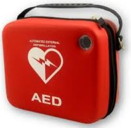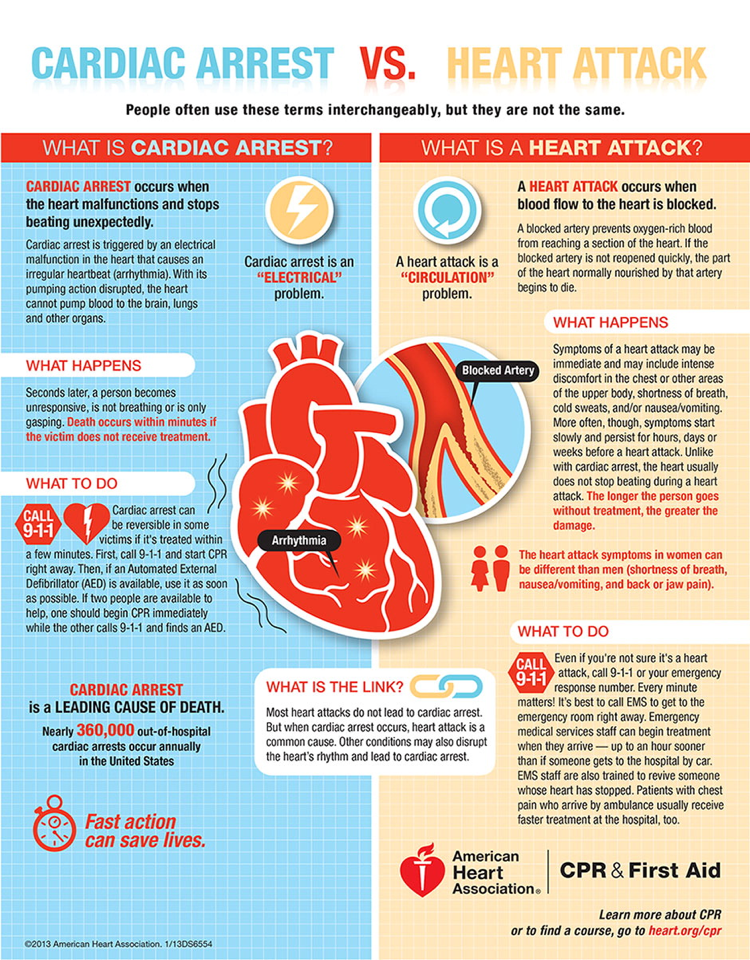There are two common types of heart incidents. A Heart Attack and Sudden Cardiac Arrest.
Acute Heart Attack: (MI)
An acute heart attack [also known as a myocardial infarction (MI)] is the death of heart muscle from the sudden blockage of a coronary artery by a blood clot.
If blood flow is not restored to the heart muscle within 20 to 40 minutes, irreversible death of the heart muscle will begin to occur. Muscle continues to die for six to eight hours.
See: Types of heart attacks ClevelandClinic.org
Symptoms: Chest pain; radiating pain in left arm, between shoulder blades, and/or jaw; difficulty breathing, cold sweats, nausia.
Treatment: Call 911, Take an aspirin. Chew the aspirin slowly, which is more effective than swallowing it whole. Put the person in a sitting postition, with knees raised.
Don't rely on a family member or friend to drive you to the Emergency Room.
In 1993 the American Heart Association began recommending a 325 mg aspirin dose at the onset of chest pain or other symptoms of a severe heart attack. That bit of advice is going unheeded, though; a follow-up report published in 1997 shows as many as 10,000 American lives a year could be saved if more people who thought they were having heart attacks took an aspirin at the start of chest pains.
You should chew the aspirin before swallowing for quicker entry into the blood stream.
See:
Aspirin: Questions and Answers | FDA.gov
Acute Myocardial Infarction (Heart Attack) | MayoClinic.org
Symptoms and Diagnosis of Heart Attack | American Heart Assn.
Coughing:
In 1999 an email began circulating online saying that rhythmically coughing can squeeze the heart and keep the blood circulating giving you time to get help.
However, you were to attempt cough CPR at the wrong time (because you misjudged the kind of cardiac event being experienced) or went about it in the wrong way, it could make matters worse.
In 2003 a Polish doctor claimed he to train patients to do cough CPR correctly.
The American Heart Association does not recommend this.
Dr. Richard O. Cummins, Seattle's director of emergency cardiac care says that
cough CPR should be used only by a person about to lose consciousness, an indication of cardiac arrest. It can be dangerous for someone having a heart attack that does not result in cardiac arrest. Such a person should call for help and then sit quietly until help arrives, he says.
Source: Cough CPR : snopes.com
Sudden Cardiac Arrest: (SCA)
What people call a Massive Heart Attack is usually Sudden cardiac arrest (SCA), an electrical problem where the heart goes into an irregular heart beat (arrhythmia) such as ventricular fibrillation (V-fib).
Heart Failure (HF) is a change in the electrical function of the heart that predispose it to potentially lethal cardiac arrhythmias.
About 5% of people with heart failure will go into Sudden Cardiac Arrest.
Symptoms: In seconds the person becomes unresponsive and is not breathing, only gasping. Death will occur within minites without treatment.
Treatment: Call 911, Start Cardiopulmonary resuscitation (CPR), If an Automated external defibrillator (AED) is available, use it.
If no one knows how long the person has been unconscious, or if an AED isn't readily available, do 2 minutes of CPR. Then use the AED.
 AEDs are user-friendly devices that untrained bystanders can use to save the life of someone having SCA.
AEDs are user-friendly devices that untrained bystanders can use to save the life of someone having SCA.
Before using an AED, check for puddles or water near the person who is unconscious. Move him or her to a dry area, and stay away from wetness when delivering shocks (water conducts electricity).
See
- Symptoms & Emergency Treatment of Cardiac Arrest
- How To Use an Automated External Defibrillator - NHLBI, NIH
- Adult AED Training - AED Training Videos by ProCPR

Source: American Heart Association
An e-mail message circulated in 2009 with titles like "HEART ATTACK & ASIPRIN DO NOT LIE DOWN" and "Why keep aspirin by your bedside?" tells you to take aspirin and do not lie down when you get symptoms of a heart atack.
Aspirin is good advice. It prevents blood platelets from sticking together.
Some of the e-mails also claim aspirin has a 24-hour "half-life".
It's pain-killing and inflammation-countering properties actually have a much shorter half-life (from 3-9 hours depending on the dosage [500mg - 2 g]), but the effect on blood's platelets lasts about 7-10 days.
As to the lying down advice, there is no evidence that your outcome is affected by lying down or remaining upright.
AED
Terms:
- Acute Coronary Syndrome (ACS)
- An umbrella term for situations where the blood supplied to the heart muscle is suddenly blocked. e.g. heart attack, or unstable angina.
- Acute Myocardial Infarction (AMI)
- Heart atack
- Angine pectoris
- Chest pain. Stable angina refers to the more common understanding of angina related to myocardial ischemia.
Unstable angina may occur unpredictably at rest which may be a serious indicator of an impending heart attack.
- Arrhythmia -
- Any variation from the normal rhythm of the heart beat. Most arrhythmias are harmless, but some are not. Tachycardia (fast heart rate), bradycardia (slow heart rate) (e.g., sinus arrhythmia, premature beat, heart block, atrial fibrillation, atrial flutter, pulsus alternans, and paroxysmal tachycardia).
See Types of Arrhythmia - NHLBI, NIH
- Coronary Artery Disease (CAD)
- The major blood vessels that supply your heart with blood, oxygen and nutrients — become damaged or diseased. Cholesterol-containing deposits (plaque) in your arteries and inflammation are usually to blame for coronary artery disease.
- ischemia
- a restriction in blood supply
- Myocardial Infarction (MI)
- Heart atack
- NSTEMI - Non-ST-segment elevation myocardial infarction
- Acute ischaemia of heart tissue sufficient to cause tissue damage where there is no ST-segment elevation on electrocardiogram (ECG) recordings.
- Sudden Cardiac Arrest (SCA)
- Also referred to as a "Massive Heart Attack" is an electrical problem with heart rhythm. See above.
- Thrombosis
- The formation or presence of a blood clot in a blood vessel (vein or artery).
Glossary - Thrombosis Adviser
Links:
Coronary Artery Disease
Heart Attack, Stroke and Cardiac Arrest Warning Signs | AmericanHeart.org
CPR | heart.org
Heart attack symptoms: Know what signals a medical emergency - MayoClinic.com
Heart Attack or Sudden Cardiac Arrest: How Are They Different? | National Heart Association
Myocardial Infarction (Heart Attack) Causes and Warning Signs
last updated 28 June 2013
|  Health
Health
 Cardiovascular Disease
Cardiovascular Disease
 Heart Attack
Heart Attack
 Health
Health
 Cardiovascular Disease
Cardiovascular Disease
 Heart Attack
Heart Attack